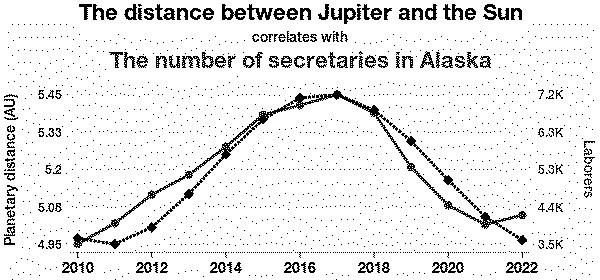Comment by Fabian Pittroff
Robert’s talk Replacing Theories? Scraping Theoretical Debates in the Digital Humanities was not only a great fit for this summer term’s theme, but also posed a provocative question from the outset: Is there a movement within the field of digital humanities away from the use of theory? Following Chris Anderson’s 2008 provocation The End of Theory, an extreme scenario would be the replacement of any theoretical framework by some version of ‘numbers speaking for themselves’. The latter is the belief (or theory?!) that given enough data, analysis of this data will reveal correlations without any presuppositions. Although this notion has been heavily criticized in recent years, for one, by pointing out the difference between correlation and causality. Nonetheless, it is useful to consider what impact this debate has had on the digital humanities and its use of theory.

The distance between Jupiter and the Sun correlates with the number of secretaries in Alaska, dithered, original from https://tylervigen.com/spurious/correlation/2733
To explore the use of theory in the digital humanities, Robert built a web-scraping apparatus to collect data from selected journals in the field. Besides unearthing a wide variety of uses of the term theory in this way, this approach is so thought-provoking because it uses a typical digital humanities’ method to explore how the digital humanities talk about themselves. Listening to Robert’s account of the digital humanities as a social world on the one hand, and his struggles of building a usable scraping mechanism on the other, the project almost turned into an auto-ethnography of digital humanities methods. Surely, an inspiring proof of concept and worthwhile continuing.
But are theories actually being replaced in digital humanities discourse? Robert suggests that, based on his sample, theories may be replaced by mentions of theory – that is, the dropping of names rather than the development of new concepts. Furthermore, in some instances, the reflexive use of methods was considered an equivalent substitute for theoretical framing. The reflexive use of methods is indeed essential, but theory is more than mere methodology. Whatever theory is, it is also useful as a distinct counterpoint to method, that’s not limited to the reflection of methods. Instead, theory makes possible more daring, improbable and astonishing comparisons (Luhmann 1992: 409).
References
Anderson, Chris (2008): The End of Theory, in: Wired, https://www.wired.com/2008/06/pb-theory/, last access 8.7.2024.
Luhmann, Niklas (1992): Die Wissenschaft der Gesellschaft, Frankfurt a.M.: Suhrkamp.
